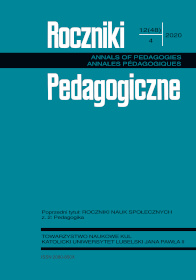Innovation in Initial Diagnosis Stimulating the Development of Moral Reasoning in Pedagogical Counseling
Main Article Content
Abstract
Triggering the developmental potential of students, also in the sphere of morality, is one of the main tasks of education. Performing didactic, educational, protective and preventive functions, in addition to teachers the school employs pedagogues to carry out these functions. Undoubtedly, their important tasks include diagnosis, which is confirmed by the law and regulations governing their work. It is expected that the school, in addition to the passing knowledge, will develop in young people the desired level of axiological competence, their talents and predispositions, different types of skills, especially of a social nature, shape creativity, sensitivity or expected moral attitudes. The changes taking place in the modern world, including Poland, have caused, on many levels and also in education, a crisis that results in many individuals being lost, not believing in their own abilities, but also in selfishness. The aim of this article is to show the innovation and value of self-constructed research tool—questionnaire for initial diagnosis which can stimulate the process of developing moral reasoning of teenagers in the work of the school pedagogue in pedagogical counseling on a specific example based on the perspective of thirty years work experience as a pedagogue and many personal scientific investigations of a theoretical and research nature. The author of this article concludes that even the diagnostic level can stimulate the person, be encouraging and liberating. The paper argues that in care and educational situation, which is the domain of the pedagogue’s activity, the diagnostic work, especially the stimulation, plays the key role. It allows not only to diagnose, but also gives the opportunity to stimulate the researcher’s self-reflection, showing the perspectives and opportunities that may not have been previously noticed. The method of the diagnostic survey and the survey technique were used. initial diagnosis, enabling young students to accompany the process of developing moral reasoning. Having at least knowledge about their life experiences, moral competences, it is easier to shape the pedagogue’s way of work stimulating their development of moral reasoning. Preparing graduates of pedagogy for work as school pedagogues, unfortunately often has a very theoretical character. This makes it difficult to start the practical fulfillment of duties in this position. Young pedagogues therefore improve their skills and gain experience during every day work, through trial and error method on the “living” material–their students.
Article Details
References
Gruca-Miąsik, U. (2011). Negocjacje i mediacje – w kregu pomocy, wychowania i prawa [Negotiations and mediations – in the circle of help, education and law]. Rzeszów: Wydawnictwo UR.
Gruca-Miąsik, U. (2012). Moral Dimension of Functioning of Foster Families Viewed From the Systemic Perspective (2001-2011). Rzeszów: Wydawnictwo UR.
Gruca-Miąsik, U. (2015). Rozumowanie moralne młodzieży. Wybrane obszary i konteksty [Moral reasoning of young people. Selected areas and contexts]. Rzeszów: Wydawnictwo UR.
Gruca-Miąsik, U. (2016). Diagnostyczno-stymulująca działalność pedagoga szkolnego w sytuacji opiekuńczo-wychowawczej [Diagnostic-stimulating activity of a school counselor in a care and educational situation]. W: U. Gruca-Miąsik (ed.), Opieka jako kategoria wychowawcza. Metody i formy stymulacji dzieci i młodzieży w rodzinie i środowisku lokalnym [Care as an educational category. Methods and forms of stimulation children and youth in the family and local environment] (p. 249–260). Rzeszów: Wydawnictwo UR.
Gruca-Miąsik, U. (2018). Rozumowanie moralne – osoba, rozwój wychowanie [Moral reasoning – a person, development, upbringing]. Rzeszów: Wydawnictwo UR.
Huang, W., Ho, J.C. (2018). Improving moral reasoning among college students: a game-based learning approach. Interactive Learning Environments, 26(5), 583–596.
Jarosz, E., Wysocka, E. (2006). Diagnoza psychopedagogiczna. Podstawowe problemy i rozwiązania [Psychopedagogical diagnosis. Basic problems and solutions]. Warsaw: Żak.
Kielar-Turska, M. (1992). Jak pomagać dziecku w poznawaniu świata [How to help your child in learning about the world]. Warsaw: WSiP.
King, A., Schneider, B. (1999). Pierwsza rewolucja globalna. Jak przetrwać? [The First Global Revolution. How to survive?]. Warsaw: Polskie Towarzystwo Współpracy z Klubem Rzymskim.
Mintchik, N.M., Farmer, T.A. (2009). Associations Between Epistemological Beliefs and Moral Reasoning: Evidence from Accounting. Journal of Business Ethics, 84, 259-275.
Shapiro, L.E. (1999). Jak wychowywać dziecko o wysokim EQ? [How to raise a child with a high EQ?]. Warsaw: Prószyński i S-ka.
Thornberg, R., Jungert, T. (2017). Callous-Unemotional Traits, Harm-Effect Moral Reasoning, and Bullying Among Swedish Children. Child and Youth Care Forum, 46(4), 559–575.
Tokarski, J. (1997). Słownik wyrazów obcych [Dictionary of foreign words]. Warsaw: PWN.
Weber, J., Elm, D.R. (2018). Exploring and Comparing Cognitive Moral Reasoning of Millennials and Across Multiple Generations. Business and Society Review, 123(3), 415-458.

